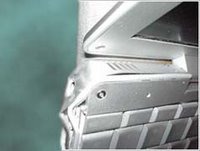Back to the Manufacturer
The Seventh Sunday in Ordinary Time
Today’s Readings: Isa. 43: 18–25; Ps. 41; 2 Cor. 1: 28–22; Mk. 2: 1–12
My brother, Greg, is pretty clever when it comes to computers. He’s got a knack for getting dead wireless network connections to spring back to life, silent speakers to play again, uncooperative programs to run smooth as silk. Why, he’s not even afraid to take a screwdriver and open up the back of the case if that’s what it takes to fix something.
Greg is a college professor and he uses his computer all the time, even for PowerPoint presentations during his lectures and seminars. He bought himself one of those fancy Apple Macintosh PowerBook G4 laptops, and one fateful day, about a year ago, he was carrying it from the lecture hall back to his office.
 He’s not quite sure what happened—either he slipped or some gremlin jostled him—and the next thing he knew, the computer had flown out of his hands down an entire flight of stairs. When the poor Mac stopped moving and Greg’s heart started up again, let’s just say that the result was not pretty.
He’s not quite sure what happened—either he slipped or some gremlin jostled him—and the next thing he knew, the computer had flown out of his hands down an entire flight of stairs. When the poor Mac stopped moving and Greg’s heart started up again, let’s just say that the result was not pretty.Even Greg, with all his computer fix-it skills, couldn’t get his Mac running again. He had to send it back to Apple, so the manufacturer could repair all the damage and make it good as new—actually better, since some of the parts and components had now been upgraded.
I thought about this calamity as I read today’s first reading from the prophecy of Isaiah. The people of Israel were in rather a mess—much like Greg’s busted-up computer lying at the bottom of the stairway. Their whole nation—socially, politically, religiously—was in shambles. They had been conquered by the Babylonian army and were forced into exile. Many families were torn apart in the process. Their king was held captive. Even their magnificent temple, built so gloriously by King Solomon, was desecrated and destroyed. The people’s spirit was crushed. In short, the Jewish nation was broken beyond repair. No amount of tinkering or bailing wire could patch this once-great nation back together again.
Against this backdrop, Isaiah tells the heartbroken people of Israel essentially this: we can’t fix things ourselves. The damage is too great, too extensive. But the good news is, the One who made us can fix us. You might say, we’ve got to send our nation back to the manufacturer.
Isaiah appeals to his fellow Jews by speaking so beautifully and poetically about God’s power and love. He says, “In the desert I make a way and in the wasteland, rivers.” In other words, picture the desert at its worst: swirling, blustering, disorienting, ever-shifting sands… Not only can God tame this arid and barren desert and build a roadway through it, but also he can fill it with an endless supply of fresh water and make it burst into life. “If only you have faith in God to fix things,” says Isaiah, “you’ll see that the God who created us will certainly redeem us.”
That redemption required a whole new world order.
The original order of things was wonderful: God made a beautiful world and filled it perfectly with living things. Humanity’s idyllic domain amid this perfection was the Garden of Eden… until Adam and Eve crashed down harder than Greg’s computer. The damage began then and there, and over the ages, it only got worse and worse. Sin had absolutely corrupted creation.
We see God’s new world order—his repair and renovation, you might say—in the gospel today: When Jesus saw their faith, he said, “Child, your sins are forgiven.”
How beautifully simple! Since sin caused the damage, God decided to make the necessary repairs by taking away the sin. And not just that, but he also made a better world order by making the former sinners members of his family! Child, your sins are forgiven…
The church has always taught that all we have to do is confess our sins and be absolved to get us back on track with God and stay a member-in-good-standing in this new world order.
But frankly, most people these days don’t realize that they’re even broken or in need of repair. There aren’t usually lines at the confessionals.
Nevertheless, there are times in life when we might find ourselves in a situation that seems pretty hopeless—beyond repair. Finding out that you or someone close to you is dying with a terminal illness is a pretty good example. There comes a time when you’ve got to accept that the end of the road is coming.
In my own ministry, I’ve been blessed so many times to witness this last leg of the journey. You might think that a person would become bitter or frustrated or angry… but I can’t recall a single person like that. Amazingly, people discover in themselves acceptance and peace. To use the metaphor I’ve been repeating, it’s as if they realize that their situation is simply unfixable, so it’s time to send it back to the manufacturer for repair.
Once they’ve made this decision, not only do people typically find acceptance and peace, but they also bless God more than ever! They thank him for his goodness and his many gifts. They appreciate their family and friends and all the kindnesses people have done for them more than ever. They find that their love for God is actually strengthened and deepened. In other words, through their struggles and suffering, they find their faith. When Jesus saw their faith, he said, “Child, your sins are forgiven.”
Do we really have to be sick or dying or otherwise broken beyond repair to appreciate and learn from today’s soothing lesson? Wouldn’t it be great to remember all the time that God is with us always, committed to rescue and redeem us no matter what. We are totally safe with him not just when times are utterly bleak, but also when they’re just so-so or even absolutely great.
Today, I pray that we can all turn through Jesus Christ to our good and gracious God—to thank him for all his blessings and to deepen our faith, which is the foundation of everything. My friends, we may not be totally broken, but it seems pretty clear we can all stand a divine tune-up.


